
Filter News
Area of Research
- Advanced Manufacturing (3)
- Biology and Environment (8)
- Building Technologies (3)
- Clean Energy (54)
- Computer Science (4)
- Electricity and Smart Grid (1)
- Functional Materials for Energy (1)
- Fusion and Fission (1)
- Materials (26)
- Materials for Computing (4)
- National Security (2)
- Neutron Science (8)
- Nuclear Science and Technology (4)
- Quantum information Science (9)
- Supercomputing (29)
News Topics
- (-) Buildings (57)
- (-) Composites (26)
- (-) Molten Salt (8)
- (-) Quantum Science (69)
- 3-D Printing/Advanced Manufacturing (121)
- Advanced Reactors (34)
- Artificial Intelligence (91)
- Big Data (53)
- Bioenergy (91)
- Biology (98)
- Biomedical (58)
- Biotechnology (22)
- Chemical Sciences (63)
- Clean Water (29)
- Climate Change (99)
- Computer Science (187)
- Coronavirus (46)
- Critical Materials (26)
- Cybersecurity (35)
- Decarbonization (79)
- Education (4)
- Element Discovery (1)
- Emergency (2)
- Energy Storage (108)
- Environment (194)
- Exascale Computing (37)
- Fossil Energy (5)
- Frontier (42)
- Fusion (54)
- Grid (62)
- High-Performance Computing (84)
- Hydropower (11)
- Irradiation (3)
- Isotopes (53)
- ITER (7)
- Machine Learning (47)
- Materials (144)
- Materials Science (140)
- Mathematics (7)
- Mercury (12)
- Microelectronics (3)
- Microscopy (51)
- Nanotechnology (60)
- National Security (61)
- Net Zero (13)
- Neutron Science (131)
- Nuclear Energy (108)
- Partnerships (44)
- Physics (61)
- Polymers (33)
- Quantum Computing (34)
- Renewable Energy (2)
- Security (24)
- Simulation (47)
- Software (1)
- Space Exploration (25)
- Statistics (3)
- Summit (57)
- Sustainable Energy (125)
- Transformational Challenge Reactor (7)
- Transportation (97)
Media Contacts
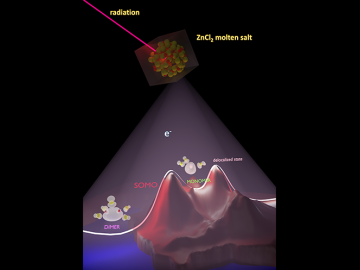
In a finding that helps elucidate how molten salts in advanced nuclear reactors might behave, scientists have shown how electrons interacting with the ions of the molten salt can form three states with different properties. Understanding these states can help predict the impact of radiation on the performance of salt-fueled reactors.
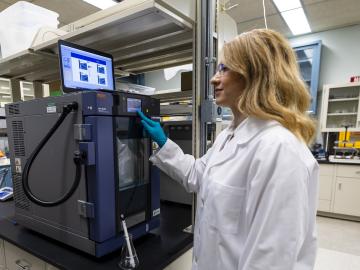
The common sounds in the background of daily life – like a refrigerator’s hum, an air conditioner’s whoosh and a heat pump’s buzz – often go unnoticed. These noises, however, are the heartbeat of a healthy building and integral for comfort and convenience.
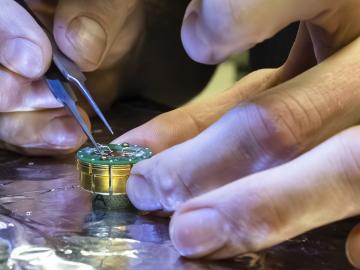
Quantum computers process information using quantum bits, or qubits, based on fragile, short-lived quantum mechanical states. To make qubits robust and tailor them for applications, researchers from the Department of Energy’s Oak Ridge National Laboratory sought to create a new material system.
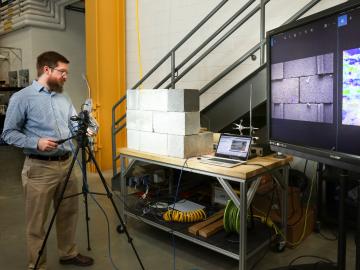
Researchers at the Department of Energy’s Oak Ridge National Laboratory have created a new detection system that allows home energy auditors to see air leaking from a building in real time with the help of a camera.

A new nanoscience study led by a researcher at ORNL takes a big-picture look at how scientists study materials at the smallest scales.
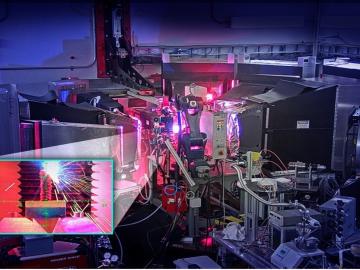
Technologies developed by researchers at ORNL have received six 2023 R&D 100 Awards.
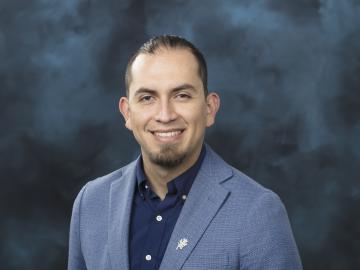
Bryan Maldonado, a dynamic systems and controls researcher at ORNL, has been recognized by the 2023 Hispanic Engineer National Achievements Awards Conference, or HENAAC, with the Most Promising Engineer Award.

Kashif Nawaz and Mahabir Bhandari, building technologies researchers at the Department of Energy’s Oak Ridge National Laboratory, were recognized for research achievements in support of ASHRAE during the 2023 annual conference.
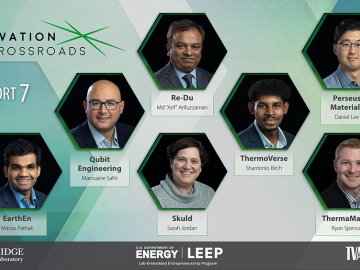
Seven entrepreneurs will embark on a two-year fellowship as the seventh cohort of Innovation Crossroads kicks off this month at ORNL. Representing a range of transformative energy technologies, Cohort 7 is a diverse class of innovators with promising new companies.

Scientist-inventors from ORNL will present seven new technologies during the Technology Innovation Showcase on Friday, July 14, from 8 a.m.–4 p.m. at the Joint Institute for Computational Sciences on ORNL’s campus.


